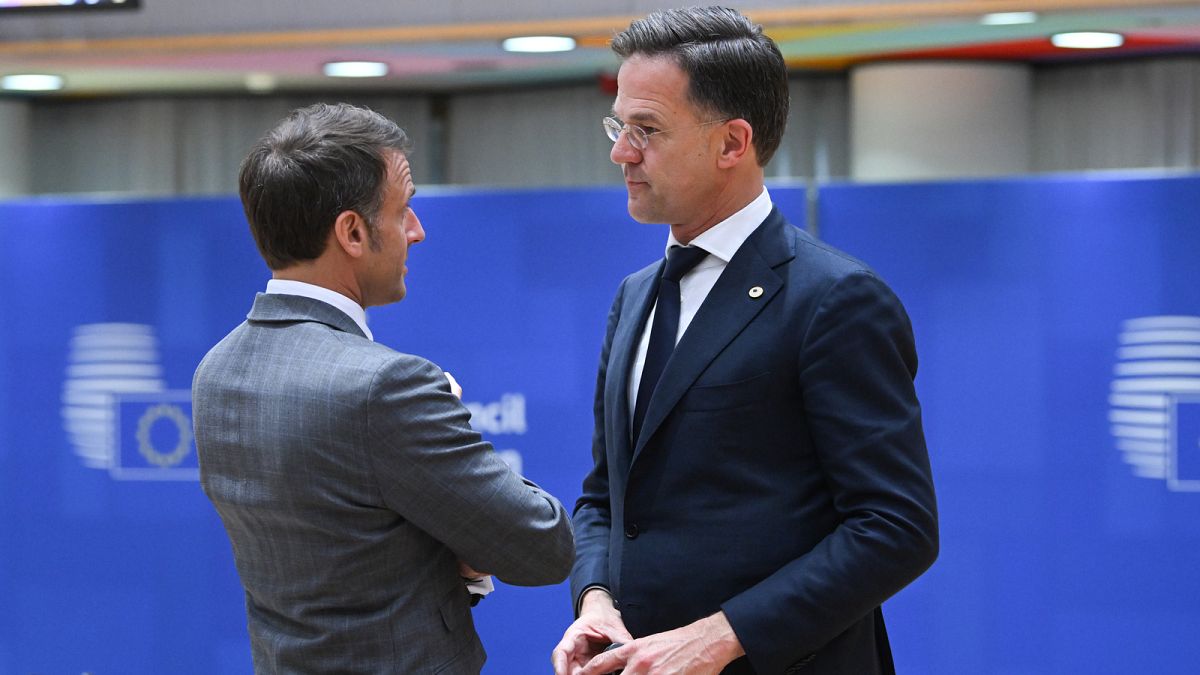EU leaders under pressure to bolster Ukraine’s struggling air defences
The EU’s 27 leaders face mounting pressure to step up efforts to protect Ukraine’s skies from Russian airstrikes, after President Zelenskyy took a jab at Western allies’ “flagging political will” over the weekend. Speaking ahead of a gathering of leaders in Brussels on Wednesday evening, both German Chancellor Olaf Scholz and the Netherlands’ caretaker Prime […]


The EU’s 27 leaders face mounting pressure to step up efforts to protect Ukraine’s skies from Russian airstrikes, after President Zelenskyy took a jab at Western allies’ “flagging political will” over the weekend.
Speaking ahead of a gathering of leaders in Brussels on Wednesday evening, both German Chancellor Olaf Scholz and the Netherlands’ caretaker Prime Minister Mark Rutte called for urgent steps to provide Kyiv with the air defence systems it needs to fend off the barrage of missiles launched from Russia.
Both leaders suggested the bloc’s countries need to look closely at their stockpiles and consider sending their own air defence systems to Kyiv.
“In view of all the terrible attacks that are being made from the air, you can see that it is necessary to do something,” Scholz explained.
“Everyone has to take a look at their stocks to see if other air defence systems, in particular Patriots, may be dispensed with, because they are now so urgently needed in this specific situation,” the German Chancellor added.
Rutte said leaders should consider reaching the “maximum pain threshold” of exhausting their own supplies by donating to Ukraine, before “scurrying in other parts of the world” for the sophisticated anti-missile systems.
In the summit’s draft conclusions, seen by Euronews, leaders underline “the need to urgently provide air defence to Ukraine and to speed up and intensify the delivery of all necessary military assistance.”
It comes after Zelenskyy censured Western allies over the weekend for refusing to provide Ukraine with ‘maximum protection’ from Russian missile airstrikes by using their own aircrafts to directly intercept missiles, as they did in the skies above Israel.
France, the UK and the US came to Israel’s aid on Saturday when a barrage of some 185 drones and 150 ballistic and cruise missiles were launched as part of Tehran’s first ever direct attack on the non-NATO country.
“European skies could have received the same level of protection long ago if Ukraine had received similar full support from its partners in intercepting drones and missiles,” Zelenskyy said in a video message on social media platform X on Sunday.
Asked by Euronews how he reacted to Zelenskyy’s accusation of double standards, Rutte said: “Let’s not try to mingle up (Ukraine with) Israel. Ukraine needs all the air defence and all the shell capacity we can get for them – I totally understand what Zelenskyy said, but I’m not going to comment on that – I want to find practical solutions to deliver for him.”
Despite support for the move among all three Baltic states, NATO has repeatedly dismissed Kyiv’s pleas for a no-fly zone above parts of Ukraine over fears of being pulled into a direct conflict with Russia, a nuclear power.
Allies have supplied Kyiv with sophisticated missile defence systems – including radars, command-and-control technology and interceptors – capable of thwarting Russian strikes, but these have been rapidly exhausted by Russia’s onslaught. On Saturday, Germany announced it would set another Patriot air defence system to Ukraine.
The Ukrainian President is set to address EU leaders by video-conference during Wednesday evening’s discussions.
Keep Ukraine in focus
The pleas came ahead of a summit designed to focus on the EU’s economy and competitiveness, but which is set to be overshadowed by the crisis gripping the Middle East.
“I am concerned that we are losing the focus on Ukraine,” Lithuanian President Gitanas Nausėda said ahead of the meeting, slamming the bloc for slow implementation of promised deliveries of weapons to Kyiv.
“We have to celebrate the time of delivery of our weaponry and not the time of decision making,” he said. “Because sometimes the gap, the time gap between the decision making and implementation takes few or even more months.”
The EU failed to hit its target of providing Ukraine with one million ammunition rounds within a year, prompting the Czech Republic to launch its own initiative to fill Ukraine’s ammunition gap by sourcing up 800,000 shells – to which several EU countries are chipping in with cash.
Speaking alongside her Dutch and Czech counterparts earlier on Wednesday, Danish Prime Minister Mette Frederiksen said that the “format” of the Czech-led ammunition could be replicated for air defence systems.
During Wednesday’s discussions, leaders are also hoping to give extra spur to plans to use windfall revenues from Russian assets frozen in the EU to help arm and reconstruct Ukraine.














